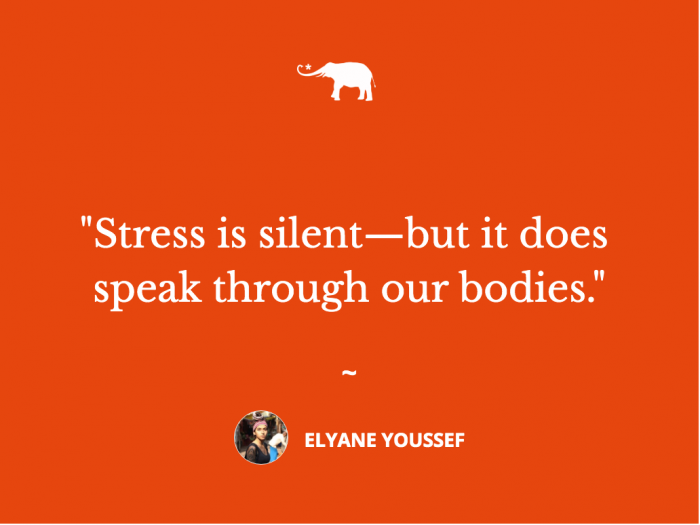View this post on Instagram
Let’s admit it: we’re all stressed.
Confused and amazed, you might swiftly think to yourself, “No, I’m not!”
You are. Trust me, darling, you are.
As long as we’re working, finishing up tasks, tending to the needs of others, tending to our own needs, and basically just…living, we’re always going to be stressed.
Even when we do things that are supposed to calm us down, we are stressed.
When we’re meditating, we’re not sure if we’re doing it right. When we’re working out, we’re worried we might never lose fat. When we’re cooking, we’re on the fence about the recipe. When we’re alone, we’re hesitant.
So yes, we are always stressed. The good news is now you know it; the bad news is, most times, you don’t know it. That’s why most of you might have thought you don’t feel stressed, when, in fact, we’re all stressed as f*ck.
This reminds me of the time when I (kinda) forced my doctor to request all kinds of blood tests and scans because I had heart palpitations and I thought I was dying. After multiple tests and the results looking normal, my doctor said that stress was triggering my heart palpitations.
I was so upset he said that to me. I mean, I was never angry in my day-to-day activities, and I was damn sure that I wasn’t feeling stressed.
After a couple of days and after giving my daily routine some thought, I was surprised to realize that my doctor was right. I was stressed about work, about my relationship, about my body, about family issues, and about money.
And that was when I learned that stress doesn’t necessarily mean anger, upset, yelling, or punching things. Stress is when something overwhelms and consumes us. It’s when we’re frustrated about finding a solution or a way out. It’s when we’re overthinking, worried, or confused.
Stress is silent—but it does speak through our bodies.
It can affect our whole emotional, physical, and mental system and leave us agitated for a long period of time.
As someone who struggles with stress on an almost daily basis, I can frankly tell you that it’s not easy to make that monster go away. However, throughout the years, I have used a few stress-reduction tools, and they have benefited me greatly.
My ways do not include walking, meditating, or journaling. They might not be conventional, but I always use them to detect whether stress has taken over my body and mind.
These four tools are not only stress detectors but are solutions too:
1. Check your posture. If you think you’re fine, your body might tell you otherwise. Double-check your posture. How are you sitting? How are you standing? When I’m in a slumped seating or standing position or have my arms crossed, I instantly know that my body is stressed. And if my body is stressed, then my mind is obviously overwhelmed.
When I switch to a seated upright position and relax my arms, it instantly affects my mind. I don’t know what’s the secret, but there’s an undeniable connection between our postures and thoughts.
When I sit upright, my mood is slightly elevated. So check your body and try not to bend down; it will only aggravate your mood.
2. Check your facial expression. Six years ago when I attended a Kundalini class in India, the teacher requested we check our facial expressions. I had no idea what he was talking about—until I actually checked my face and realized that I was tense as hell.
I truly believe that all our emotions hide in the face. What is your facial expression now? Are your eyebrows furrowed? Is your jaw clenched? Are you grinding your teeth?
When we’re stressed, we rarely check our facial expression, but doing it more often can be life-changing, really. Relax your jaw by stretching your mouth. Relax your face’s muscles. Relax your forehead. Unfurrow your brows. Now tell me how you feel afterward.
3. Smile. This has been my daily practice for a long, long time. Smiling does miracles, especially when we don’t feel like smiling. It’s therapeutic, trust me.
I’m not sure what kind of tricks my body plays on my mind, but when I smile, I think my body sends a different (good) kind of signal to my brain. Smiling appears to force our bodies to relax and calm down.
Try it next time you feel stressed. Instead of grinding your teeth, slightly open your lips and smile.
4. Check your breathing. No, I don’t mean observe your breathing; check your breathing. Where is your breath coming from? Is it coming from your chest or from your abdomen? Are your breaths short and shallow?
Thanks to my Buddhist studies and meditation courses, I realized that I was breathing wrong my entire life. Breathing from the chest denotes (and increases) stress. The correct form of breathing is what the Buddhists call in their courses “belly breathing.”
Belly breathing encourages a healthy blood circulation and slows our heartbeat. How to know if you’re breathing right? Put your hand on your stomach as you take a long inhale. Your stomach should expand, and you should feel the air actually reaching your lungs.
I instantly feel less stressed when I switch from chest to abdominal breathing.
Let me know how you feel if/when you try one of these methods.
~












Read 13 comments and reply